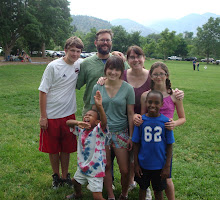By the way- I have MANY letters I have written to CWA- most lie safely in my "drafts" file- but one day I might have to get them out- they have never responded to anything I have written - even when multiple families participated in the writing of the letter to an action that affected everyone. But here is the letter I sent to Tomilee Harding- If you wonder why I am still speaking out about CWA it is because they have consistently participated in falsifying adoption records, lying to adoptive parents, avoiding the truth when it puts them at risk even when it affects a child and his or her family forever. And this next plan to build a place where they can truly harvest Ethiopian babies makes my stomach turn. If you think I am exaggerating watch this video and imagine yourself a young pregnant woman in Ethiopia- who perhaps was turned away by her family, was abused, who may have been raped and you need help- tell me placing these women in a camp with orphans being adopted and adoptive families always around would not feel coercive in relinquishing your infant- you would surely see that the child had a "way out" and you would easily be convinced that you could see this child again- that maybe even this child will grow up and come back and take care of you. You would not know the truth and the grief until it was "too late." Click here to watch the video on Acacia Village
Here is the letter I wrote to CWA today. It has to do with the change in our law allowing people with HIV to come to the US without a Waiver.
Dear Ms Harding:
You wonder why you are having to deal with the repercussions of your deceit. I think much of goes back to your reasons for not wanting to assist families in adopting children with HIV; siblings of children whose adoptions you were facilitating...because it was "bad for America". The statements you made back then about HIV just helped to promote fear and stigma. CWA should have been the first agency to facilitate adoptions of children with HIV instead of facilitating false adoptions under false pretenses. I saw a recent picture of Acacia village and it is not even close to being done- you really need to be careful what you say or your hole will get so deep it will bury you.
Below are the remarks on finally dissolving the waiver process for families adopting children with HIV, as well as allowing other visitors and immigrants in who have HIV. So, now that "America" says its ok to come to the US if you have HIV- would you be willing to facilitate an adoption of an HIV+ child?
Thanks
Emily Barr
"We often speak about AIDS as if it's going on somewhere else. And for good reason -- this is a virus that has touched lives and decimated communities around the world, particularly in Africa. But often overlooked is the fact that we face a serious HIV/AIDS epidemic of our own -- right here in Washington, D.C., and right here in the United States of America. And today, we are taking two important steps forward in the fight that we face here at home.It has been nearly three decades since this virus first became known. But for years, we refused to recognize it for what it was. It was coined a "gay disease." Those who had it were viewed with suspicion. There was a sense among some that people afflicted by AIDS somehow deserved their fate and that it was acceptable for our nation to look the other way. A number of events and advances over the years have broadened our understanding of this cruel illness. One of them came in 1984, when a 13-year-old boy from central Indiana contracted HIV/AIDS from a transfusion. Doctors assured people that Ryan White posed no risk to his classmates or his community. But ignorance was still widespread. People didn't yet understand or believe that the virus couldn't be spread by casual contact. Parents protested Ryan's attendance in class. Some even pulled their kids out of school. Things got so bad that the White family had to ultimately move to another town.It would have been easy for Ryan and his family to stay quiet and to fight the illness in private. But what Ryan showed was the same courage and strength that so many HIV-positive activists have shown over the years and shown around -- show around the world today. And because he did, we didn't just become more informed about HIV/AIDS, we began to take action to fight it. In 1990, the year Ryan passed away, two great friends and unlikely political allies, Ted Kennedy and Orrin Hatch, came together and introduced the Comprehensive AIDS Resources Emergency Act -- the CARE Act -- which was later named after Ryan." "But it will also take an effort to end the stigma that has stopped people from getting tested; that has stopped people from facing their own illness; and that has sped the spread of this disease for far too long. A couple of years ago Michelle and I were in Africa and we tried to combat the stigma when we were in Kenya by taking a public HIV/AIDS test. And I'm proud to announce today we're about to take another step towards ending that stigma. Twenty-two years ago, in a decision rooted in fear rather than fact, the United States instituted a travel ban on entry into the country for people living with HIV/AIDS. Now, we talk about reducing the stigma of this disease -- yet we've treated a visitor living with it as a threat. We lead the world when it comes to helping stem the AIDS pandemic -- yet we are one of only a dozen countries that still bar people from HIV from entering our own country. If we want to be the global leader in combating HIV/AIDS, we need to act like it. And that's why, on Monday my administration will publish a final rule that eliminates the travel ban effective just after the New Year. Congress and President Bush began this process last year, and they ought to be commended for it. We are finishing the job. It's a step that will encourage people to get tested and get treatment, it's a step that will keep families together, and it's a step that will save lives. We are continuing the work of crafting a coordinated, measurable national HIV/AIDS strategy to stem and suppress this epidemic. I'm pleased to report that the Office of National AIDS Policy, led by Jeffrey Crowley, has already held eight in a series of 14 community discussions in cities across the country. They've brought together faith-based organizations and businesses, schools and research institutions, people living with HIV and concerned citizens, gathering ideas on how to target a national response that effectively reduces HIV infections, improves access to treatment, and eliminates health disparities. And we are encouraged by the energy, the enthusiasm, and great ideas that we've collected so far. We can't give Ryan White back to Jeanne, back to his mom. But what we can do -- what the legislation that I'm about to sign has done for nearly 20 years -- is honor the courage that he and his family showed. What we can do is to take more action and educate more people. What we can do is keep fighting each and every day until we eliminate this disease from the face of the Earth."
Monday, November 02, 2009
Subscribe to:
Comments (Atom)

